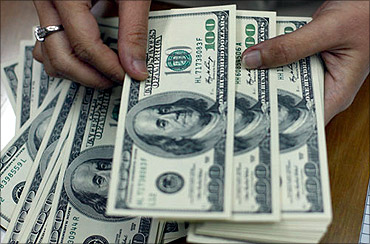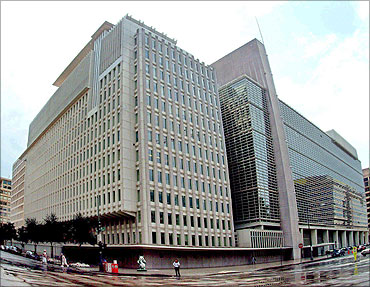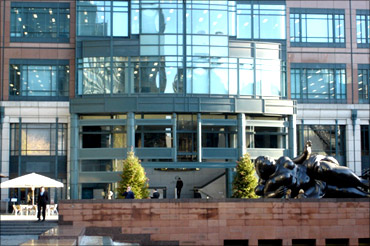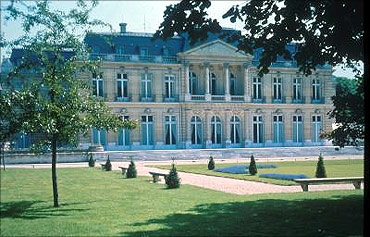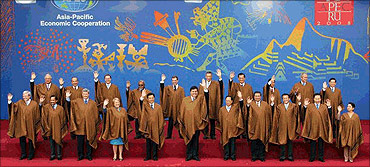 | « Back to article | Print this article |
World's top financial institutions
Many of the vulnerable countries are expected to turn to financial institutions for assistance and a lifeline.
Here is a look at some of the financial institutions charged with providing assistance, keeping the world economy in check and opening global markets for trade.
Click NEXT to read further...
World's top financial institutions
Functions: The World Bank Group, which was founded in 1945, comprises five international organizations that provide leveraged loans, primarily to developing countries.
Its five agencies are:
i) International Bank for Reconstruction and Development
ii) International Development Association
iii) International Finance Corporation
iv) Multilateral Investment Guarantee Agency
v) International Centre for Settlement of Investment Disputes
The term World Bank generally refers to the IBRD and IDA, whereas the World Bank Group is used to refer to the institutions collectively.
IBRD and IDA activities are focused on developing countries, in fields such as education, health, irrigation, rural services, roads, electricity and anti-corruption.
The IBRD and IDA provide loans at preferential rates to member countries, as well as grants to the poorest countries.
The activities of the IFC and MIGA include investment in the private sector and providing insurance respectively.
Presidency: Traditionally, the Bank President has always been a U.S. citizen nominated by the President of the United States, the largest shareholder in the bank.
Criticism: Critics argue that the so-called free market reform policies - which the Bank advocates in many cases in practice are often harmful to economic development if implemented badly, too quickly, in the wrong sequence, or in very weak, uncompetitive economies.
World Bank loan agreements can also force procurements of goods and services at uncompetitive, non free-market, prices.
Click NEXT to read further...
World's top financial institutions
Functions: The International Monetary Fund, which was founded in 1944, is an inter-governmental organization that oversees the global financial system by following the macroeconomic policies of its member countries; in particular those with an impact on exchange rate and the balance of payments.
It also provides loans with varying levels of conditionality, mainly to poorer countries.
The IMF describes itself as "an organization of 187 countries, working to foster global monetary cooperation, secure financial stability, facilitate international trade, promote high employment and sustainable economic growth, and reduce poverty."
Presidency: While the World Bank is headed by an American, the IMF's Managing Editor is always from a European country, although countries such as India, China and Brazil have been demanding a change in the system.
Criticism: Many economists have criticized IMF for providing loans based on "conditionalities", including Structural Adjustment Programmes.
The critics claim that conditionalities (economic performance targets established as a precondition for IMF loans) retard social stability and hence inhibit the stated goals of the IMF, while Structural Adjustment Programmes lead to an increase in poverty in recipient countries.
They also criticize IMF for advocating "austerity programmes," increasing taxes even when the economy is weak, in order to generate government revenue and bring budgets closer to a balance, thus reducing budget deficits.
Click NEXT to read further...
World's top financial institutions
Functions: The Asian Development Bank was set up in 1966 to boost economic development of Asian countries.
ADB was modelled closely on the World Bank, including its voting system where votes are distributed in proportion with member's capital subscriptions.
At present, both the United States and Japan hold 552,210 shares, the largest proportion of shares at 12.756 per cent each.
Criticism: Since its early days, critics have claimed that the two major donors, Japan and the US, exert extensive influence over lending, policy and staffing decisions.
Non-governmental organizations have also criticized it over its alleged insensitivity to local communities.
The United Nations Environmental Programme, said in a report that "much of the growth has bypassed more than 70 per cent of (ADB's) rural population, many of whom are directly dependent on natural resources for livelihoods and incomes".
ADB's large scale projects have also faced criticism for allegedly causing social and environmental damage due to lack of oversight.
It has also faced flak for ignoring food crisis warnings and also contributing to it by pushing loan conditions that many say unfairly pressure governments to deregulate and privatize agriculture, leading to problems such as the rice supply shortage in south-east Asia.
Click NEXT to read further...
World's top financial institutions
Functions: The European Bank for Reconstruction and Development, which was established in 1991, helps build market economies and democracies in 30 countries from central Europe to central Asia.
The Bank's mission is to support ex-communist countries establish private sectors.
Based in London, the Bank is owned by 61 countries and two international institutions.
Although owned by the public sector, it invests mainly in private enterprises, usually together with commercial partners.
EBRD offers project financing for banks, industries and businesses, both new ventures and investments in existing companies.
The EBRD provides loan and equity finance, guarantees, leasing facilities and trade finance. The Bank also finances professional development through support programmes.
It also works with publicly owned companies to support privatization, restructuring state-owned firms and improvement of municipal services.
Criticism: The EBRD has fallen under some criticism for continuing to lend in countries, particularly in central Europe, that now can access international capital markets.
Such critics complain that EBRD loans may preclude private lenders, thus forestalling these countries' entry into the global financial community.
EBRD officials contend that its loans are primarily directed toward industries or businesses that would be passed over by outside lenders, and that a necessary step toward advancement for the region depends on the sound economic policies the bank requires for loan eligibility.
Click NEXT to read further...
World's top financial institutions
Functions: Organization for Economic Cooperation and Development, which was founded in 1961, is an international economic organization of 34 countries established to boost economic progress and trade.
It defines itself as a forum of countries committed to democracy and the market economy, providing a platform to compare policy experiences, seeking answers to common problems, identifying good practices, and coordinating domestic and international policies of its members.
Most OECD members are high-income economies with a high Human Development Index and are regarded as developed countries.
The OECD's headquarters are in Paris, France.
Criticism: Critics have criticized the organization for giving membership to a select few rich nations. Its Multilateral Agreement on Investment also faced heavy criticism by several non-governmental organizations and developing countries.
Many critics argued that the agreement would threaten protection of human rights, labor and environmental standards, and the least developed countries.
The OECD has been criticized by several civil society groups and developing countries.
The main criticism has been the narrowness of the OECD because of its limited membership to a select few rich nations.
In 1997 1998, the draft Multilateral Agreement on Investment was heavily criticized by several non-governmental organizations and developing countries.
Click NEXT to read further...
World's top financial institutions
Functions: Asia-Pacific Economic Cooperation, which was established in 1989, is a forum for 21 Pacific Rim countries that seeks to promote free trade and economic cooperation throughout the Asia-Pacific.
Members account for about 40 per cent of the world's population, about 54 per cent of world GDP and about 44 per cent of world trade.
The location of the meeting rotates annually among the member economies, and a famous tradition involves the attending leaders dressing in a national costume of the host.
Criticism: APEC has been criticized for failing to clearly define itself or serve a useful purpose.
According to the organization, it is: "The premier forum for facilitating economic growth, cooperation, trade and investment in the Asia-Pacific region" established to "further enhance economic growth and prosperity for the region and to strengthen the Asia-Pacific community".
However, it has been criticized for failing to clearly define itself or serve a useful purpose.
